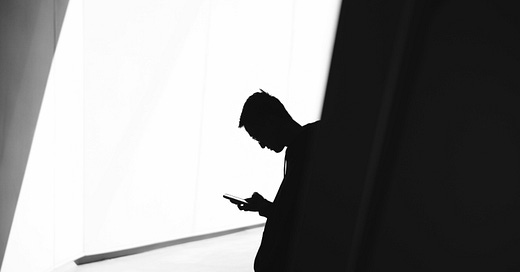The Truth About My Social Media Addiction
Social media rewired my brain. But it also gave me the world.
The only hard and fast rule I have about social media is that I won’t download TikTok.
For whatever reason, I can’t get around the seemingly definitional immaturity of the app. I truly don’t want to become a ‘TikTok person.’ It’s like watching John Mulaney—the content is fine, but it’s the fanbase that’s really off-putting (this is sarcasm, don’t cancel me). But even though I may not be on the most addicting app for my generation, don’t take that to believe that I’ve avoided social media addiction. Far from it.
The Damage
Author Simon Sinek once told audiences, “If you wake up and you check your phone before you say good morning to your girlfriend, boyfriend, or spouse, you have an addiction.” Simply put, that’s been the last 3 years of my life. There are days when I’ve been on Twitter for an hour before interacting with a single person I know, even virtually. Before you tell me I have a problem, I’m well aware. And now, it seems, the heights of American intelligentsia are coming back around to realizing just how damaging social media addiction is for young minds.
U.S. Surgeon General Vivek Murphy recently called for a warning label on social media platforms, a suggestion that, while unlikely to materialize, represents a growing trend of Internet hawkishness. At the academic level, the Los Angeles School District recently voted 5 to 2 to ban its student body of almost half a million kids from using cellphones and social media in school. On the philosophical side, psychologist and public intellectual Jonathan Haidt is leading the charge to raise awareness about social media addiction among America’s youngest generations, including in his most recent book, The Anxious Generation: How the Great Rewiring of Childhood is Causing an Epidemic of Mental Illness.
“Gen Z became the first generation in history to go through puberty with a portal in their pockets that called them away from the people nearby and into an alternative universe that was exciting, addictive, unstable,” Haidt asserts in Anxious Generation. “There is very little evidence showing benefits to adolescent mental health from long-term or heavy social media use.”
I agree with much of Haidt’s analysis, and in a perfect world where paternalism works and kids obey rules, I might hold out that solutions like Murphy’s or the L.A. School Districts are hitting the heart of the problem. But that’s not the real world—banning young people from doing things makes them want to do it more, and if you doubt that, it’s possible you’ve never met one. And let’s not pretend that the things my generation are running to are all bad. I can look to my own life as an example of why the virtual drug of Internet access is so potent.
The Light in the Tunnel
Social media is addictive—this I know. I wouldn’t say that my relationship with my phone, from the Tracfone of yesteryear to the iPhone of the modern day, has ever been perfectly healthy. Yet, as a high schooler and college student, social media opened up the world to me. Instagram allowed me to deepen friendships with real people, and meet new ones based on shared interests who I never would have met offline.
The global access of LinkedIn is game-changing as a journalist. It allowed me to find and interview Ukrainian humanitarians in Kharkiv, expats from Hong Kong, and former death row inmates in Tennessee without ever leaving my college dorm. The security of Signal and Telegram allows me to talk to friends in war-torn areas of the world in a way that simply wouldn’t be possible otherwise. Twitter (X), for all its problems, has given me a much keener eye into many of the most pressing dialogues in our public square. Social media has had many regretful consequences for me and my life—but it’s also opened up untold doors of opportunity and connection that I will never regret.
The same is true of millions in my generation. Social media is a tool for responsible (or irresponsible) use—the same phone that can be a conduit for vicious cyberbullying can also be a pathway to a suicide hotline, or even something as simple as a shared Internet fandom that brings joy and camaraderie.
If people, my generation in particular, live in an isolated world of decreased community, it’s simply logical that online communities can help offset, but not wholly solve, that isolation.
I have work to do on my own relationship with social media. But it’s not as simple as getting off of Twitter and going on a walk in the woods (although I need to do that more). The modern age’s challenge to my generation is the ability to act with excellence, wisdom, and balance in both the online and offline world—and that’s a teleological question that a simple warning label or school ban cannot answer.




